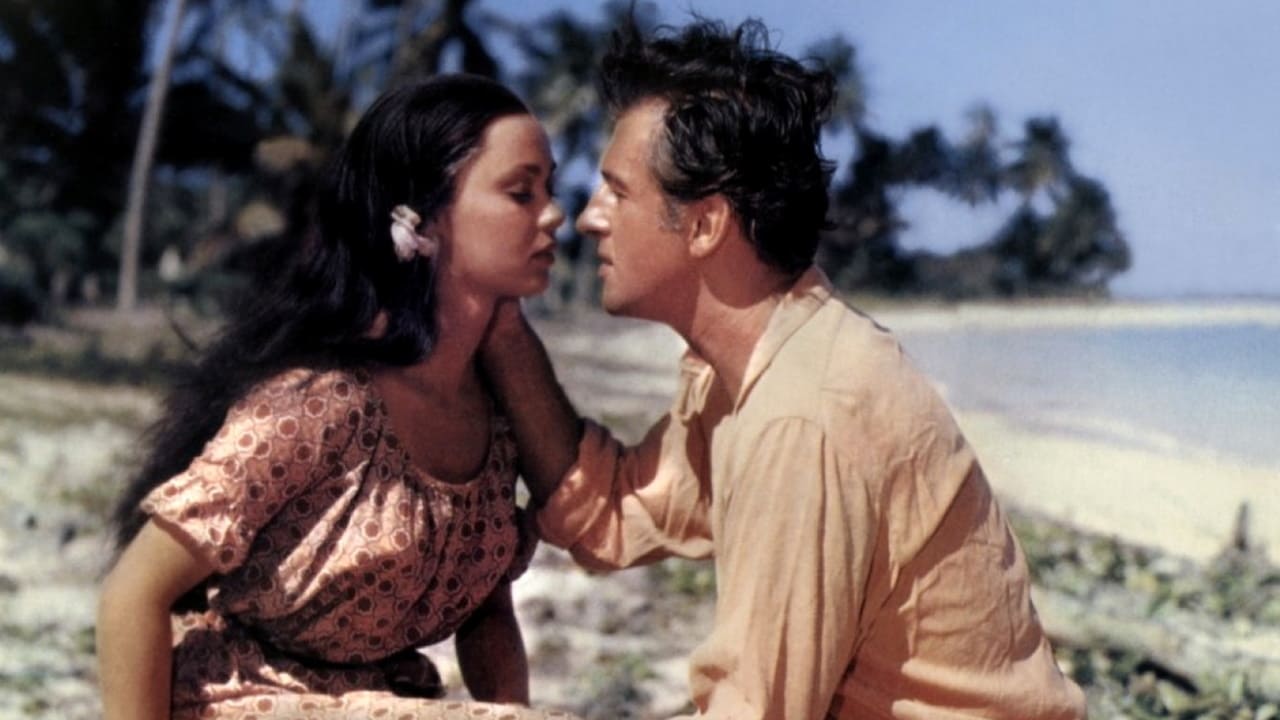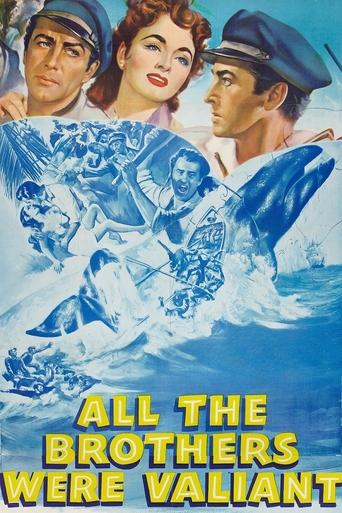SparkMore
n my opinion it was a great movie with some interesting elements, even though having some plot holes and the ending probably was just too messy and crammed together, but still fun to watch and not your casual movie that is similar to all other ones.
ActuallyGlimmer
The best films of this genre always show a path and provide a takeaway for being a better person.
Sienna-Rose Mclaughlin
The movie really just wants to entertain people.
Billy Ollie
Through painfully honest and emotional moments, the movie becomes irresistibly relatable
MartinHafer
"All the Brothers Were Valiant" is a very frustrating film to watch, as the first 95% was great--absolutely superb. And, the ending was just awful and completely undid all the good of the first portion of the film! It just made me feel like I'd been cheated--and felt like the writers never got around to thinking of a realistic ending.The film stars Robert Taylor. He's a ship's captain and is returning to port. On arrival, he's learned that his brother, another captain for the same whaling company, has disappeared and is presumed dead. Taylor soon marries young Ann Blyth (who, frankly, is too young for the middle-aged Taylor). They both set sail for another whaling trip and eventually they find the long-lost brother (Stewart Granger). Granger has a fantastic story to tell of a king's fortune in pearls--and it is waiting to be reclaimed. However, Taylor has a job to do and insists on completing his journey. Then, things start to go out of control and Taylor is forced to fight for his ship and his life--culminating in the really awful ending.It's a shame the film ended so badly. Taylor was great and the the whaling scenes were exceptionally well done. Sad, but before the ending, I was ready to give this one an 8 or 9--had the ending not been written by monkeys!! Uggh! What an ending!!!Lewis Stone's last film native girl not exactly native looking good story really good depiction of whaling scene where Taylor escapes and subdues Finch makes no sense as is ending--it ruins the picture
Robert J. Maxwell
Taylor is captain of a whaling ship in the south Pacific. His wife, Anne Blythe, is also aboard to keep Taylor from getting too nervous. The crew are a mixed lot. Somewhere along the way Taylor's ship picks up Taylor's brother, Stewart Granger, who left home long ago to pursue various unsavory adventures, leaving behind a history of family friction.Granger relates a tale of falling in with a couple of douche bags, Kurt Kaszner and James Whitmore, who show him a stash of pearls in the lagoon of an island inhabited by hostile natives. Before they can make off with the millions of dollars of rare pearls, the two miscreants are killed and Granger barely escapes alive.Back aboard Taylor's ship, Granger invites him to forget about any past frictions and join him in getting the pearls. Forget the whaling business. It sounds pretty good to Anne Blythe, who has always had a bit of a crush on the roguish Granger, but Taylor's face is grim as he declares that he, the captain, will carry out the ship's mission, which is to kill whales.Stewart seduces Blythe and incites a mutiny. That's the kind of guy he is. There is a knockabout fist fight, and Granger changes sides to fight side by side with his brother and -- well, medical discretion forbids the revelation of additional plot details, but, this being a 1950s movie, you can guess the ending.Interesting to see Stewart Granger in the role of irresponsible and light-hearted adventurer, kind of an Errol Flynn role. Robert Taylor's acting makes a quantum leap in this film -- he manages to suggest two emotions at the same time. As an actress, Anne Blythe had a pretty voice.The score is by Miklos Rozsa. You can tell from the moment that first signature six-note phrase appears. We're told Rozsa was a musical prodigy. There's no reason to doubt it, but he recycled the same tone and even the same melodies from one movie to the next. Dmitri Tiomkin was also distinctive, but you can tell one score from another. "The Guns of Navarron" doesn't sound like "Red River." But here, if you close your eyelids, you find you're watching "Ben Hur" unroll on their interiors.I hate to sound too sarcastic about this but it really is a dated by-product of the old Hollywood. It seems to have been ground out like a Sonic Burger. Everyone wears clean clothes. The men are closely shaved except those who look like supporting players and extras who have been instructed to grow beards so they look villainous. The tans are not from the weather but from Max Factor. After a monstrous gut-busting fist fight, nobody has a mark on him -- and this was after "Shane". The scenes aboard ship are studio bound. There's not a puff of wind.Strictly routine.
Michael Morrison
Another commenter mentioned the un-likelihood of a whaler captain taking his bride on a projected three-year voyage.In fact, sailors, a generally superstitious lot, often found women on a ship to be a jinx.Then, too, today the very act of whaling is so P non-C that a lot of people will object to that aspect, rather than concentrating on the fact the story is set at a time no one saw a particular problem with killing the sea-going mammals for their oil.Robert Taylor gives one of his best performances; Stewart Granger comes across very well.Ann Blyth has some good scenes, and some bad ones, but she does them all well.One really attractive aspect of "All the Brothers" is a superb supporting cast. Peter Whitney, for example, has one of his best roles in a very long career. He too often plays a dumb or bumbling character, but here he is a strong person in a pivotal position.Leo Gordon has a smaller role, but he stands out, as does John Lupton, in a larger part.Frank DeKova (whom I met on the set of "Johnny Firecloud") was a superb character actor but who was too often relegated to small roles. He could have been a bigger star, with his talent, but he was recognized by his peers, anyway.The great Glenn Strange and the great John Doucette were aboard, adding their enormous talents and, as so often true in Hollywood, not getting screen credit.Come to think of it, this movie is worth watching just for the great cast. But be prepared to suspend your disbelief, and don't look at the blue eyes of the "native girl."
bkoganbing
Robert Taylor and Stewart Granger are the brothers Shore, Taylor good, Granger bad. Stewart Granger has been lost at sea, presumed dead. Taylor marries Granger's sweetheart, Ann Blyth, and takes her with him on the next whaling voyage. Mind you these voyages last two to three years sometimes.Well call me an oldfashioned romantic, but it seems like you marry the girl do the honeymoon thing for a month or so and THEN go to sea. Granted that Ann is a New Bedford girl and has been brought up in that culture, but yeeeeesh.Of course Granger's found on the voyage and with Blyth along and Granger wanting to go after some pearls he left behind in the lagoon of a very unfriendly native island, this causes all kinds of complications. If you're interested, buy or rent the video.Robert Taylor was a most agreeable employee at MGM known for accepting everything they offered him in parts. Stewart Granger also accepted a lot of parts he didn't want to, but that was because wife Jean Simmons could fight for roles she wanted. Either way both these guys got took on this one.This was also the final film of Lewis Stone who may have appeared in more MGM films than anyone else. Maybe Lionel Barrymore is the only other player that could contest that. He should have gone out on something better.

